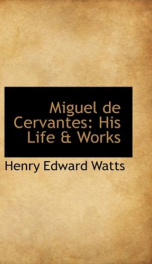life of miguel de cervantes

Purchase of this book includes free trial access to www.million-books.com where you can read more than a million books for free. This is an OCR edition with typos. Excerpt from book: CHAPTER III. NO passage in Cervantes' chequered and ill-starred life is so full of melancholy interest as his five years' captivity in Algiers. That dismal record called the Calamities of Authors contains many a painful chapter; but to no man of letters did it ever happen to endure a torture so exquisite as that which it was the unhappy lot of the author of Don Quixote to bear. Camoens, in his old age, half-blind and crippled, begging his daily bread in the streets of Lisbon, is a sufficiently pathetic figure. But Camoens was at least among his own people, and it was by Portuguese, whom he glorified and tried to exalt, that he was starved and neglected. Cervantes, in whom we recognise so many traits, physical and moral, in common with the poet of the Lusiads, was in the prime and flower of manhood, with the bloom of his valiant deeds in soldiership fresh upon him, when he was taken prisoner and left to drag out his life in chains, a slave to the hereditary persecutors of his nation and creed. The mind cannot conceive, for one gifted with the poet's and soldier's temperament, at the threshold of what seemed a career full of promise, a more terrible stroke of fortune than that which now fell on Cervantes. Algiers, that den of pirates which had insolently raised itself in the very face of the mostpotent of the Christian states and barred the road to the inland sea, was then at the height of its powera power which, strange to say, no maritime nation dared to contest. The armaments directed against the Turk would have sufficed to beat down the walls of Algiers and extirpate that hornet's nest. But for some reason, which those who interpret the policy of nations have failed to explain, none of the Christian states ventured to assail this outwork of Islam, which was ten times more da... --This text refers to an alternate Paperback edition.
Info about the book
Author:
Series:
Unknown
ASIN:
B002KJ26U6
Rating:
4.5/5 (2)Your rating:
0/5
Languge:
English
Users who have this book
Users who want this book
What readers are saying
What do you think? Write your own comment on this book!
write a commentif you like life of miguel de cervantes try:
Other books by this author
Do you want to exchange books? It’s EASY!
Get registered and find other users who want to give their favourite books to good hands!



